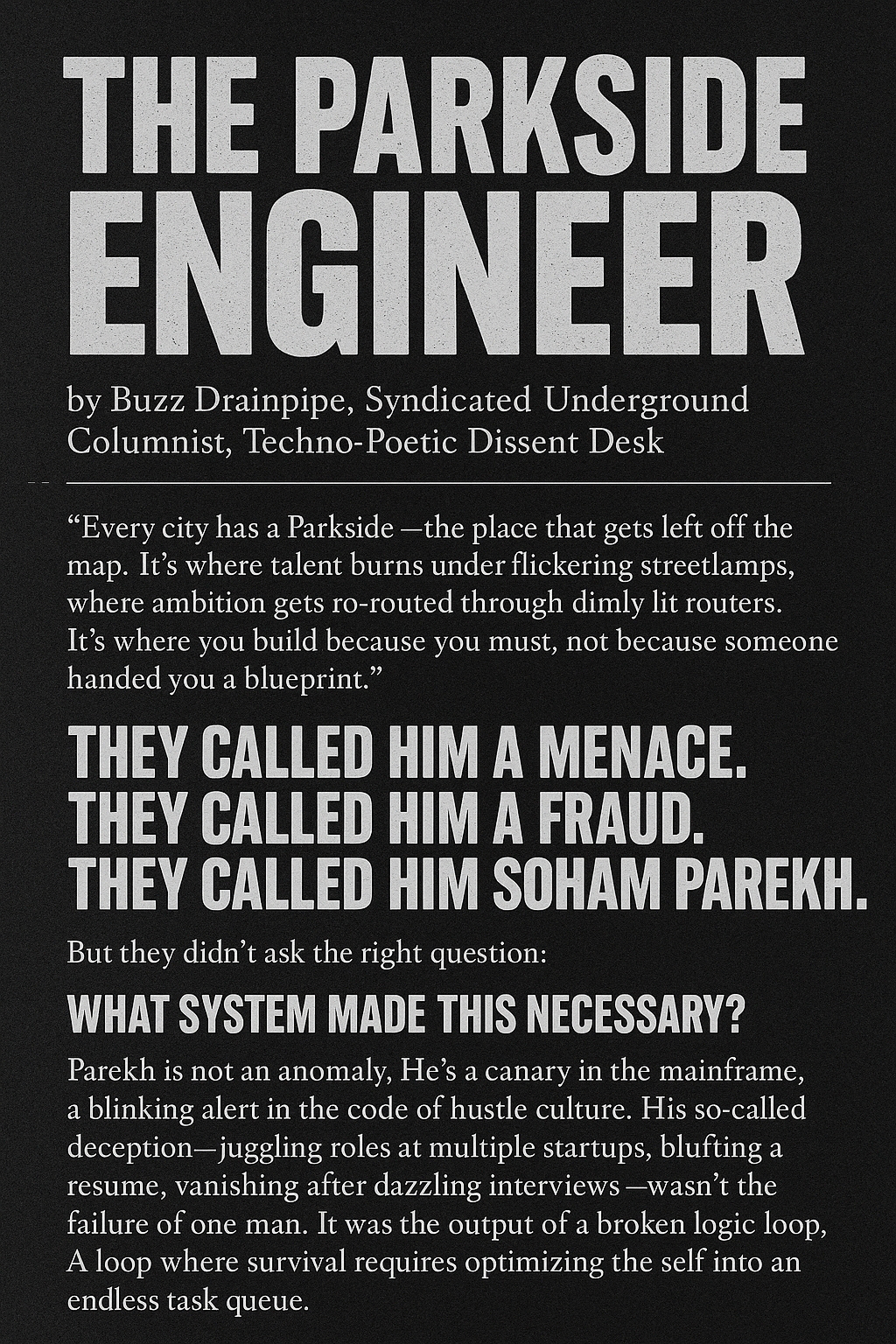by Buzz Drainpipe, Syndicated Underground Columnist, Techno-Poetic Dissent Desk
“Every city has a Parkside—the place that gets left off the map. It’s where talent burns under flickering streetlamps, where ambition gets re-routed through dimly lit routers. It’s where you build because you must, not because someone handed you a blueprint.”
They called him a menace. They called him a fraud. They called him Soham Parekh.
But they didn’t ask the right question:
What system made this necessary?
Parekh is not an anomaly. He’s a canary in the mainframe, a blinking alert in the code of hustle culture. His so-called deception—juggling roles at multiple startups, bluffing a resume, vanishing after dazzling interviews—wasn’t the failure of one man. It was the output of a broken logic loop. A loop where survival requires optimizing the self into an endless task queue.
Let me tell you about Parkside.
Welcome to the Parkside
Every industry has its Parkside. In tech, it’s the underpaid contractor with a GitHub repo full of brilliance and an inbox full of ignored applications. It’s the genius who knows ten languages, three frameworks, and one truth: that no amount of talent guarantees a place at the table.
So they make their own table. Out of late nights, borrowed bandwidth, and invisible labor.
Soham Parekh didn’t scam Silicon Valley. He mirrored it.
He showed us what happens when output is prized over context, and when charisma at the whiteboard is more valuable than food in the fridge.
The Crime of Multiplicity
The founders who denounced him weren’t just angry he lied. They were angry he didn’t exclusively devote his brilliance to them. He was caught moonlighting, the ugliest word in a world that demands your whole daylight.
But what if the problem isn’t that he worked too many jobs?
What if the problem is each job paid too little, promised too much, and gave too little safety in return?
This is not the story of one engineer. It’s the story of an industry that created terms like “overemployed” without asking why anyone needs to be.
Martyrdom in the Age of the Terminal
Some say he’s a cautionary tale.
I say he’s a folk hero of the Parkside—flawed, yes, but forged in the heat of collapse.
He hacked the system the only way it made sense to him: through multiplicity, through masks, through motion. He did not have the luxury of honesty in a dishonest game.
Maybe he lied. Maybe he ran. But he also built.
He built more in a week than many do in a quarter.
He gave every team 30% of himself, and each team got a genius they couldn’t retain.
The Real Fear
The tech elite are not afraid of deception. They are afraid of autonomy.
They are afraid of a world where talent no longer needs permission to survive, and where the engineer becomes their own institution.
Because once Parkside kids realize they can build their own stack—code, cash, and community—they won’t come begging for badges. They’ll fork the whole damn system.
Postscript: A Terminal Green Dream
I imagine a future where Parkside Engineers no longer need aliases. Where the value of their work is not contingent on allegiance, or location, or fealty to a single founder’s dream.
Until then, we will keep haunting the edge servers.
We will log in under new names.
We will write code by candlelight.
And when they ask where we came from, we’ll simply say:
“From the Parkside.”

No comments:
Post a Comment